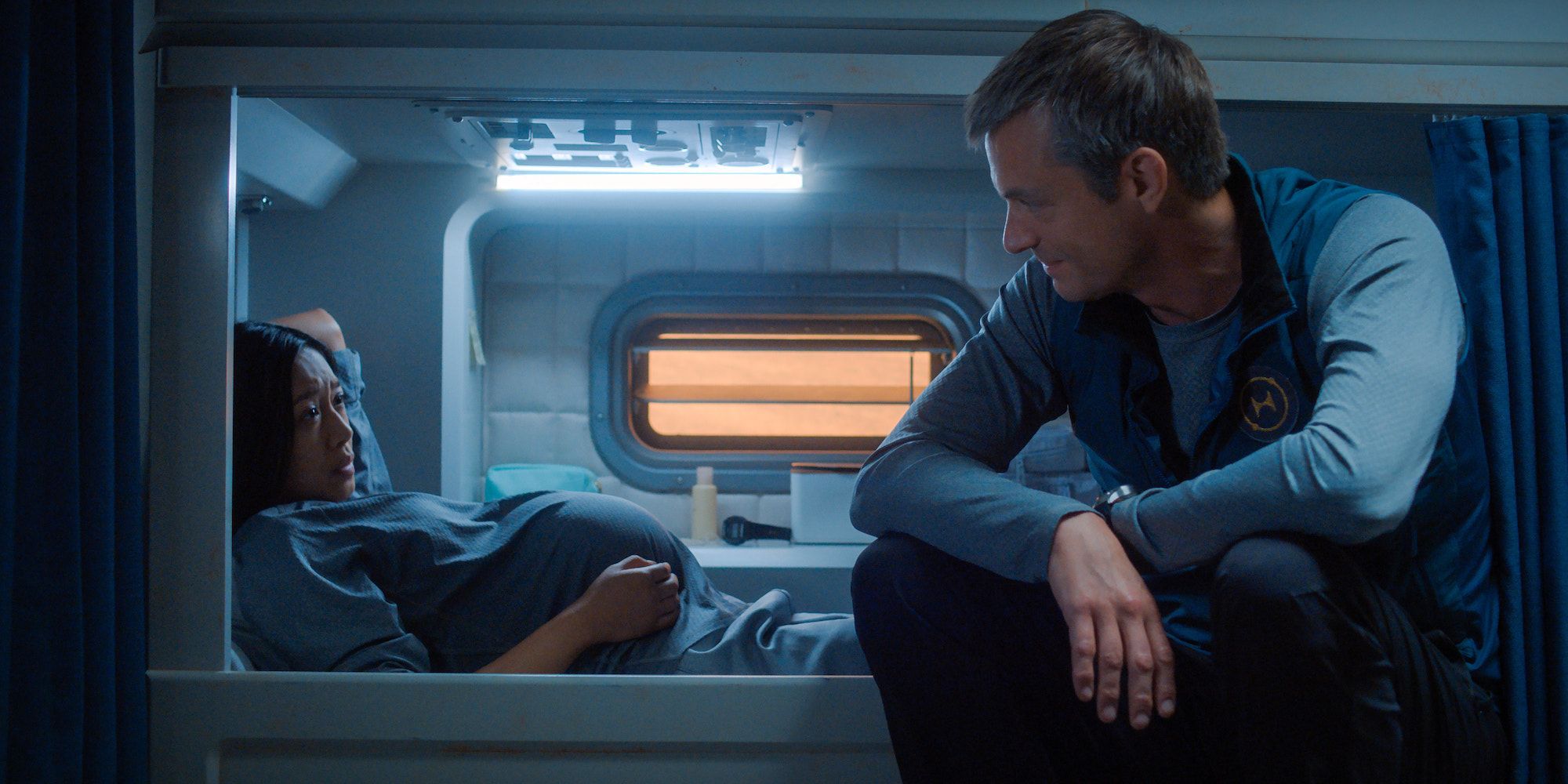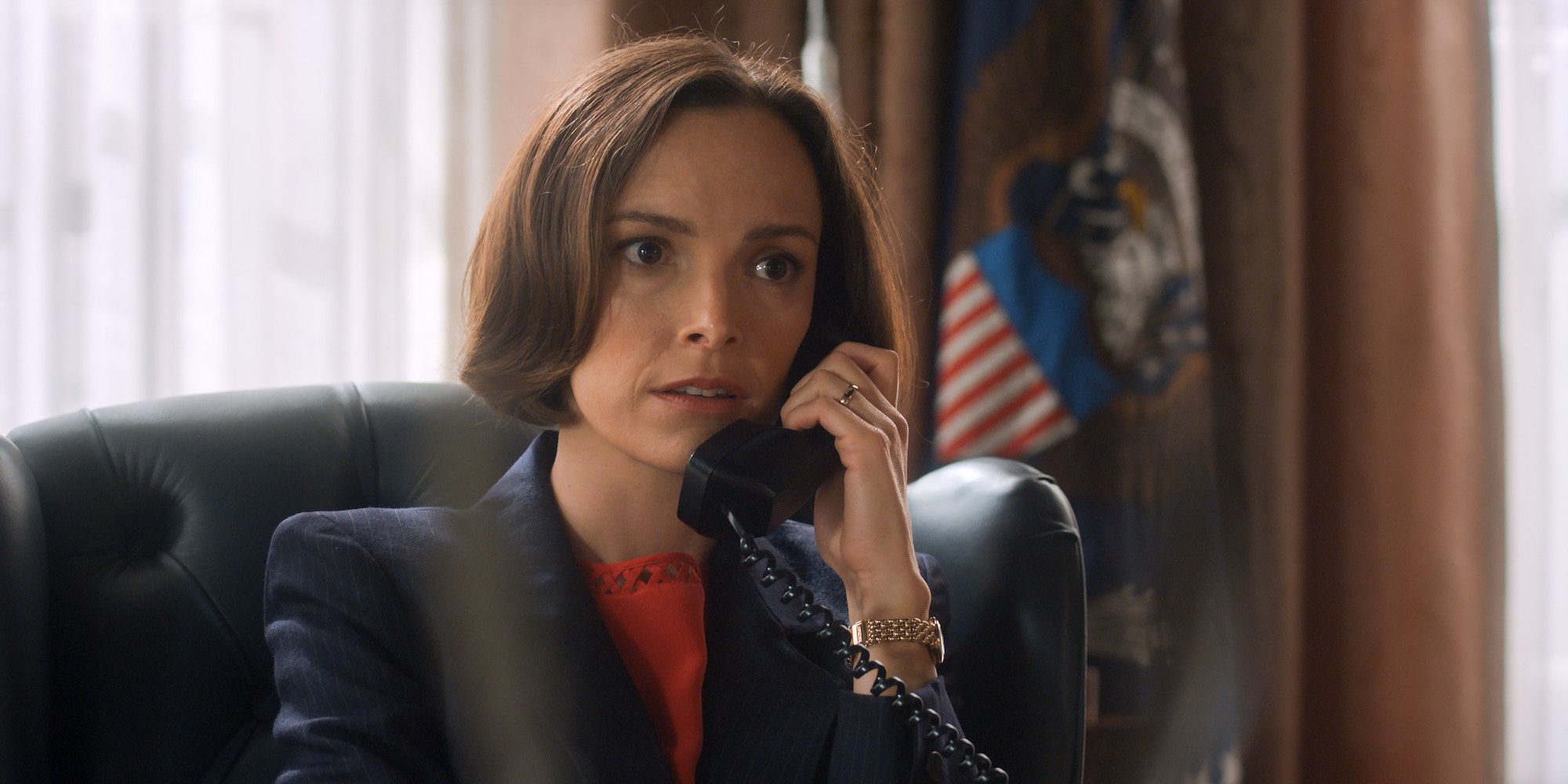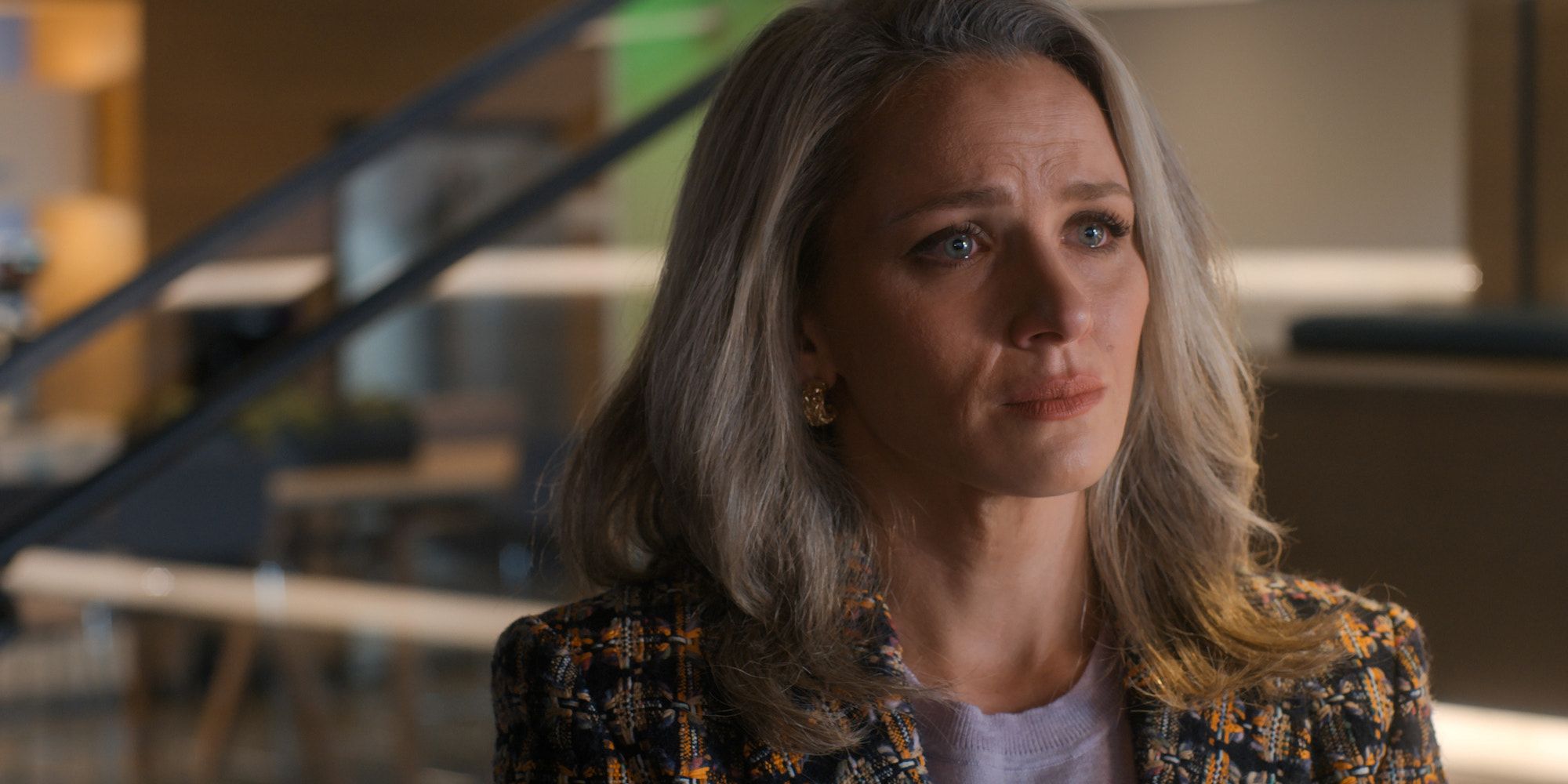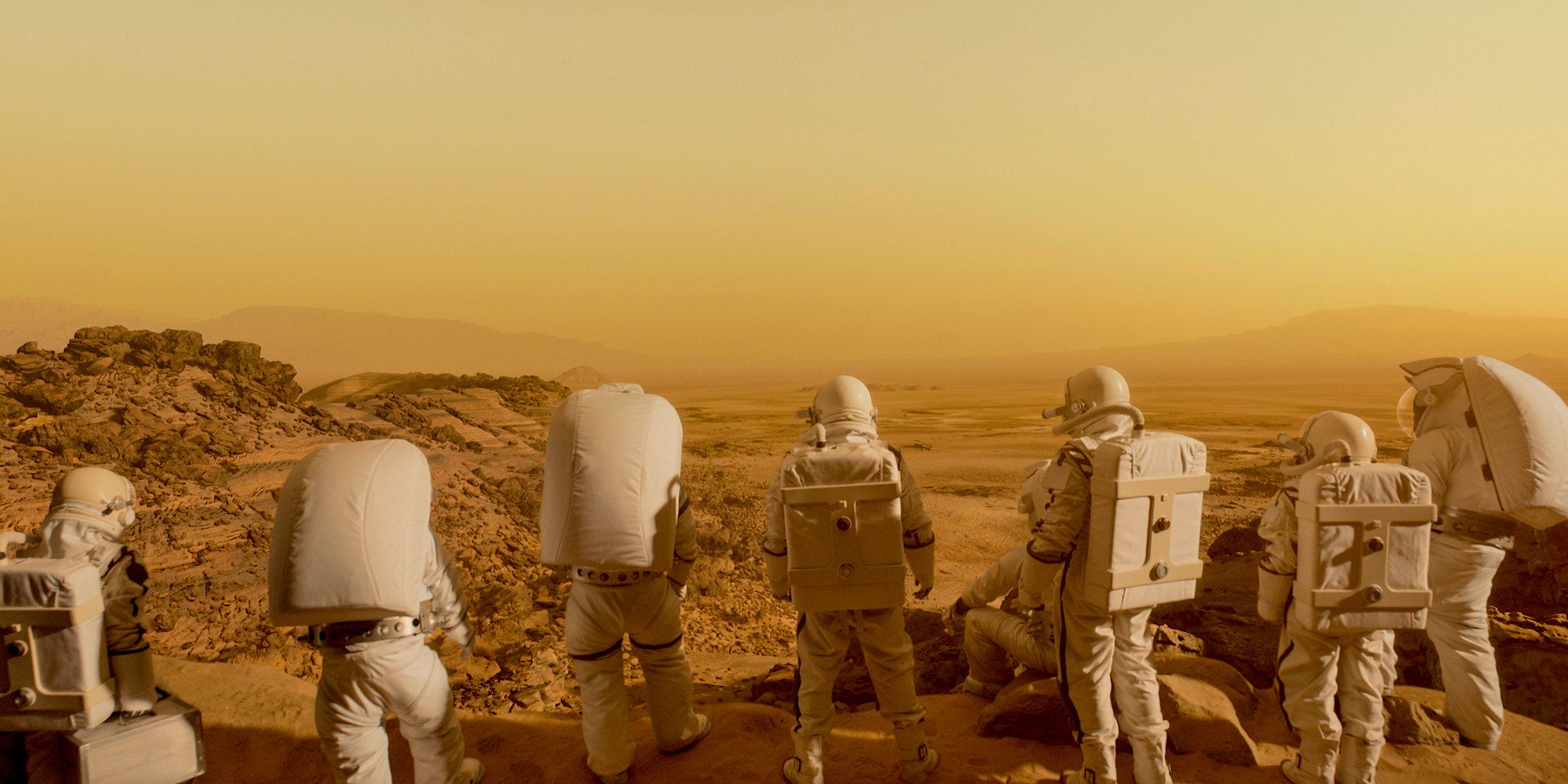Warning: SPOILERS from For All Mankind season 3, episode 10.For All Mankind season 3 concludes in astronomical fashion, as the Apple TV+ series orchestrates a series of heart-pounding events both on Earth and in outer space. Created by Ronald D. Moore, alongside co-showrunners and executive producers Ben Nedivi and Matt Wolpert, For All Mankind explored Mars in season 3 and focuses on the three-way race to land a crew on the Red Planet.
The season's 10-episode run saw Ellen Wilson (Jodi Balfour) become President of the United States, Commander Danielle Poole (Krys Marshall) land NASA and the Soviets' combined crew on Mars, Kelly Baldwin (Cynthy Wu) make history as the first pregnant person on Mars, and a massive landslide take out several crew members on the surface of the Red Planet. For All Mankind season 3's twists and turns prior to the finale paved the way for yet another exhilarating finish before the series jumps ahead 10 years.
For All Mankind's season 3 finale subverts all expectations by opening with the story of a North Korean cosmonaut (C. S. Lee) who had landed on Mars before NASA's Sojourner 1. Furthermore, while those on the ground conjure a successful plan for Ed Baldwin (Kelly Baldwin) to shuttle Kelly to Phoenix to deliver her baby Mars orbit in typical For All Mankind fashion, the season's most consequential event transpires in the episode's final 15 minutes when NASA's Johnson Space Center is bombed by Jimmy Stevens' (David Chandler) cohorts. For All Mankind also bids farewell to two main characters, Karen Baldwin (Shantel VanSanten) and Molly Cobb (Sonya Walger, who lose their lives in the JSC disaster after having been with the show since season 1.
Screen Rant spoke with Nedivi and Wolpert, who explained the shocking events of For All Mankind season 3's finale, their rationale behind those character deaths, and what could be next out of the show's original main cast.
Screen Rant: There are so many shocking developments toward the end of this season. I want to start the North Korea twist. How did that idea come about to make it so that none of the three original competitors had won the Mars race?
Matt Wolpert: It was something that we discovered in the room of season 3. When we wrote the end of season 2, we actually had no idea whose boots those were. We were like, "Let's just see some boots, and we'll figure it out later." So, I think the more we got into talking out the different versions of "Was it an American?" "Was it a Russian?" "Was it someone from the private sphere?" they all felt sort of underwhelming because they were all expected on a certain level. So, having that wild card come in was really something that we felt would be a great jolt at the end of the season.
Seeing how the reveal of Lee from Danielle and Kuznetsov's perspective as kind of an ominous presence, and then at the beginning of [episode] 10, reversing that to see his point of view and really getting to live with him as a human being, and understanding his perspective, and feeling his fear as they're coming up to his ship, that's one of the moments in season 3 that I'm the most proud of — that dichotomy of how we see each other without taking into account the humanity of the other side.
Another big event in the finale is the effort to get Kelly back to Phoenix to deliver her baby. We’ve seen other very innovative missions before like the duct tape space suits in season 2, so how did you create this elaborate way for Ed to get her there?
Ben Nedivi: I feel like every season we have that goal of that crazy thing we're going to do at the end. "Can we really pull that off?" and by the end, I feel like we just do. As crazy as that mission is, and it's pretty crazy, it is grounded in science. There is science to back that attempt. But, man, it was really tricky to pull off. There's an expectation now almost. When you look at the end of season 1, tossing a tank of fuel almost feels quaint compared to the duct tape suit and now Kelly launching on the top of an M-SAM. But for us, really, it was this beautiful father-daughter moment of self-sacrifice and the idea of how far you will go — not only from Ed's perspective — but the fact that everyone in Happy Valley says they're willing to stay for Kelly to live felt like such as beautiful moment of togetherness, which is what this show is all about.
So, for us, that's really what backed this. Being able to tell that story of the action sequence of her being launched up in that way as realistically as possible with a few cheats here and there, I will say was really challenging from a production standpoint because we wanted to make sure you felt it not only from Ed's perspective, but from her perspective as well of "Is she going to be able to make it in time?" It's like the Apollo 13 thing of this year. These engineers on Earth come up with a crazy idea, but then it's the astronauts who have to really pull it off. We were thrilled to tell it, and we knew early on it was going to be a tricky one to pull off.
I want to backtrack to episode 9, which has arguably one of the most important moments of the entire show in Ellen’s coming-out address. How did you approach staging and writing such a defining part of a character’s arc?
Matt Wolpert: It was one of the most emotional and rewarding parts of this whole show — being able to bring that arc to a close in a way of Ellen finally being able to say to the entire world who she is, especially after the one other time she tried to do that being so rejected by Deke in season 1. When we meet Ellen, she is such a careful, guarded person and has to make a series of compromises with herself over the course of these three seasons to be able to achieve the things she wants to achieve.
For her to have the courage in that moment to say, "I'm potentially going to sacrifice — I don't know what's going to happen — I could be sacrificing everything I've worked for, but I have to be honest, finally. I have to be honest, and I can't make one more compromise." The speech that she gives, Jodi brought such humanity, and such gravitas, and such brilliance to that moment. We were there when she was giving the speech. We were on set, and everyone was just incredibly emotional because it felt like this character and Jodi had finally come to their own.
Back to the finale, it’s interesting how the real consequential disaster happens on Earth this time. What was the JSC bombing meant to signify for the show’s plot and the characters involved?
Ben Nedivi: I think it was exactly that. For us, the show is so much about tragedies happening out there, and it felt true to history and alternate history that there are tragedies that happen here on Earth as well. We love playing with actual history and how that's changed by our alternate history.
The OKC bombing was definitely something that we thought about a lot in crafting that storyline and making sure that instead of it coming out of nowhere at the end — although it does come out of nowhere — that we do plant seeds of that story from early on. Every year, we have these little threads, and everyone's like, "What is that storyline with Jimmy and these people?" I feel like we have something in mind. We've done that from season 1, where we wanted that bombing to resonate in a way not only on Earth but also suddenly you have our astronauts up on Mars having to react to tragedy on Earth, which is a flip on it.
I think that's really what it was moving forward is the idea that the space program now is the focal point of the world news, world politics. So, JSC suddenly is a political target. I think that felt appropriate but also tragic. It's not something we took lightly. We were really careful in how we captured those moments and made sure we gave them the gravity they needed in terms of not feeling like it's just a bomb, and you're cut away to credits. We wanted to really feel that tragedy unfold in a way that also allowed our characters, like Molly Cobb, to rise up in a heroic way, and then see the impact of Karen's death even with Ed up on Mars.
Speaking of Karen's death, it was very unexpected, especially considering all the advancement of her arc in season 3, and her career appearing to have a bright future. What made you decide to end her story here?
Matt Wolpert: It's interesting that you say that. That was one of the points of why we did that. She did have a bright future, and that makes the tragedy that much more because events like the Oklahoma City bombing, or 9/11, or these horrific mass-casualty events are full of people who had amazing, bright futures that were snuffed out.
I think it felt right to really bring to life the tragedy of that event, for us, that there was someone who wasn't at the end of their life and was in the middle of their story. It felt like a way to also have that loss resonate with the other characters — someone so central to the show from the beginning, who had an amazing arc from an astronaut's wife to a small business owner to a CEO. The loss to the show is immense and the loss, personally, for us, who have grown so close to Shantel.
In the writers' room when we explore deaths of certain characters, we know we're on to something, unfortunately, when we get emotional that "We can't do that! We love that character! We love that actor!" It was the same with Gordo and Tracy. We were like, "Wait. We can't do that!" But we knew in feeling that, that the audience would feel that too.
When the show has killed off main characters in the past, there has often been more buildup to it. Do you feel like you were still able to pay tribute to both Molly and Karen despite them dying so suddenly?
Ben Nedivi: Totally. I think, like Matt said, that part of it is in a bombing like this, there isn't much buildup. To really convey the shock of the moment, you don't want the death to feel like this big moment that suddenly happens. Especially with Karen, that was the feeling. I still get emotional thinking about it. It's hard because I grow so attached to these characters, but the show, itself, has to evolve over seasons. We bring in new characters every year, and I feel like we have to make sure that when we feel that we have a natural end of an arc of a character from a storytelling perspective, we're able to pull that off. I have to say, it's hard. Even with Molly, her arc evolved so much from season to season where we kept pushing off a death that was supposed to happen earlier on in her story.
Sometimes when you're writing it, and you're in the room, and you're talking about it, suddenly you realize it's that moment of, "This is the right ending. This feels like the right ending for her." I think this year we do have a lot of endings that are different for different characters but feel like a natural end of an arc for them. Just like with Gordo and Tracy, I still haven't personally recovered from that decision. It was really harsh, brought out a lot of arguments in the room between Matt and I. I think, like he said, there's something that resonates there, where if it's easy for us, then we're doing something wrong.
I was also wondering about the coincidence of Margo (Wrenn Schmidt) leaving JSC before the bombs go off. It was hinted that the Russians would help her in some way, so was her timely escape entirely luck, or was this meant to hint that either she or the Russians were somehow aware of this plot?
Matt Wolpert: I think it was really luck more than anything. In that end run, the scenes play as if they are very back-to-back, but there was time in our laying-it-out for Margo to have left the building and been on her way to wherever she was going. In our heads, she probably doesn't even find out about the bombing until she gets to the other side of the Iron Curtain. She may not have gone if she had known what happened, so that idea of having to flee and finding out later, I think, could be something that we play with later on.
Ben Nedivi: We thought about that. There's going to be conspiracy theories. The Russians, were they involved? [laughs] If that's not part of our world, I don't know what is. It's like the mystery of who did it, or what happened, or was it just Jimmy and his crew that pulled if off? I think that is an organic part of the world, unfortunately, and the world of For All Mankind, as well. So, yeah, I'm sure those questions would be in the air.
Looking ahead to season 4, I’m curious about the original main characters who are played by their original actors: Ed, Danielle, Ellen, and Margo. They’re obviously going to be on the older side in the 2000s, so what can you share about how you plan to incorporate them into the story moving forward?
Matt Wolpert: Without getting into too much detail about season 4, I think the very nature of our show is telling the story of people aging, telling the story of their lifetimes, but also needing to bring in new characters as we have done in season 2 with Kelly and Danny and in season 3 with Dev.
In season 4, there will be more new characters that will come in to shake things up and create new, interesting dynamics. But [the] old guard will still be around in various forms. Seeing the interplay between that changeover — it's a generational changeover, but it's also a tension between the old way of doing things and the new way of doing things as our world continues to evolve. So, honestly, getting the opportunity to bring in new characters every season in a fundamental, big way is one of the most exciting parts of this show for us.
For All Mankind Season 3 Synopsis
In season three, the Red Planet becomes the new frontier in the Space Race not only for the US and the Soviet Union, but also an unexpected new entrant with a lot to prove and even more at stake. Our characters find themselves going head-to-head as their ambitions for Mars come into conflict and their loyalties are tested, creating a pressure cooker that builds to a climactic conclusion.
Check out our other interviews with For All Mankind stars Jodi Balfour, Casey W. Johnson, Cynthy Wu and Edi Gathegi, as well as our SDCC interviews with the rest of the cast!
For All Mankind season 3 is available to stream on Apple TV+.




